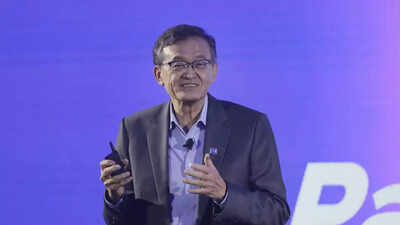Intel CEO Lip-Bu Tan replies to Donald Trump’s call to resign immediately: Let me start by saying this, the United States has been…

Intel CEO Lip-Bu Tan mounted a forceful defense of his leadership, pushing back against US President Donald Trump‘s demand for his “immediate resignation,” telling employees he has “always operated within the highest legal and ethical standards” and dismissing criticism about his Chinese investments as “misinformation.”In an internal company memo sent hours after Trump called him “highly conflicted,” Tan declared his commitment to US national security while defending his four-decade career. “The United States has been my home for more than 40 years. I love this country and am profoundly grateful for the opportunities it has given me,” he wrote to Intel employees.Trump’s public intervention came one day after Senator Tom Cotton raised three critical questions about Tan’s extensive Chinese business connections in a formal letter to Intel’s board.
CEO addresses “misinformation” about Chinese investments
Tan directly addressed the controversy surrounding his investments in Chinese firms, some linked to the People’s Liberation Army. “There has been a lot of misinformation circulating about my past roles at Walden International and Cadence Design Systems,” he told employees, emphasising Reuters reported that Tan invested at least $200 million in hundreds of Chinese companies between March 2012 and December 2024, with his venture firm Walden maintaining joint ownership with Chinese government funds in 20 investment vehicles from tech hubs like Hangzhou, Hefei and Wuxi. At least eight companies reportedly have direct ties to the Chinese military.Cotton’s August 5 letter posed three specific questions that appear to have triggered Trump’s response: whether Intel’s board knew about legal troubles at Tan’s former company Cadence Design before hiring him, whether he divested from Chinese military-linked firms, and if he disclosed remaining investments to the US government given Intel’s sensitive defense contracts. Adding to the controversy, Cadence Design Systems, where Tan served as CEO until 2021, pleaded guilty last month to illegally selling export-controlled technologies to a Chinese military university, agreeing to pay over $140 million in penalties for activities that occurred during his tenure.
Pressure mounts on Tan from board room to White House
The CEO’s challenges extend beyond Chinese investment scrutiny. The Wall Street Journal reported that the company’s board has stalled his recent efforts to raise new capital and acquire artificial intelligence companies, revealing fundamental disagreements about Intel’s future direction, including whether the chip giant should exit manufacturing entirely.Tan acknowledged the company’s transformation efforts under him, noting progress toward “high-volume manufacturing using the most advanced semiconductor process technology in the country.” Intel secured $8 billion in CHIPS Act subsidies, the largest grant to a single company, making his foreign connections particularly sensitive for national security officials.“We are engaging with the Administration to address the matters that have been raised and ensure they have the facts,” Tan wrote, expressing shared commitment with Trump’s security priorities while defending his leadership of the struggling chip giant.Intel’s challenges are particularly sensitive given its role as the largest recipient of CHIPS Act funding, securing $8 billion in federal subsidies to boost domestic chip manufacturing. “We are engaging with the Administration to address the matters that have been raised and ensure they have the facts,” Tan wrote, expressing alignment with Trump’s security priorities while defending his leadership.The CEO emphasised that Intel’s board remains “fully supportive” of transformation efforts, though Trump’s intervention adds pressure to an already embattled executive facing challenges from Wall Street, and his own boardroom.



